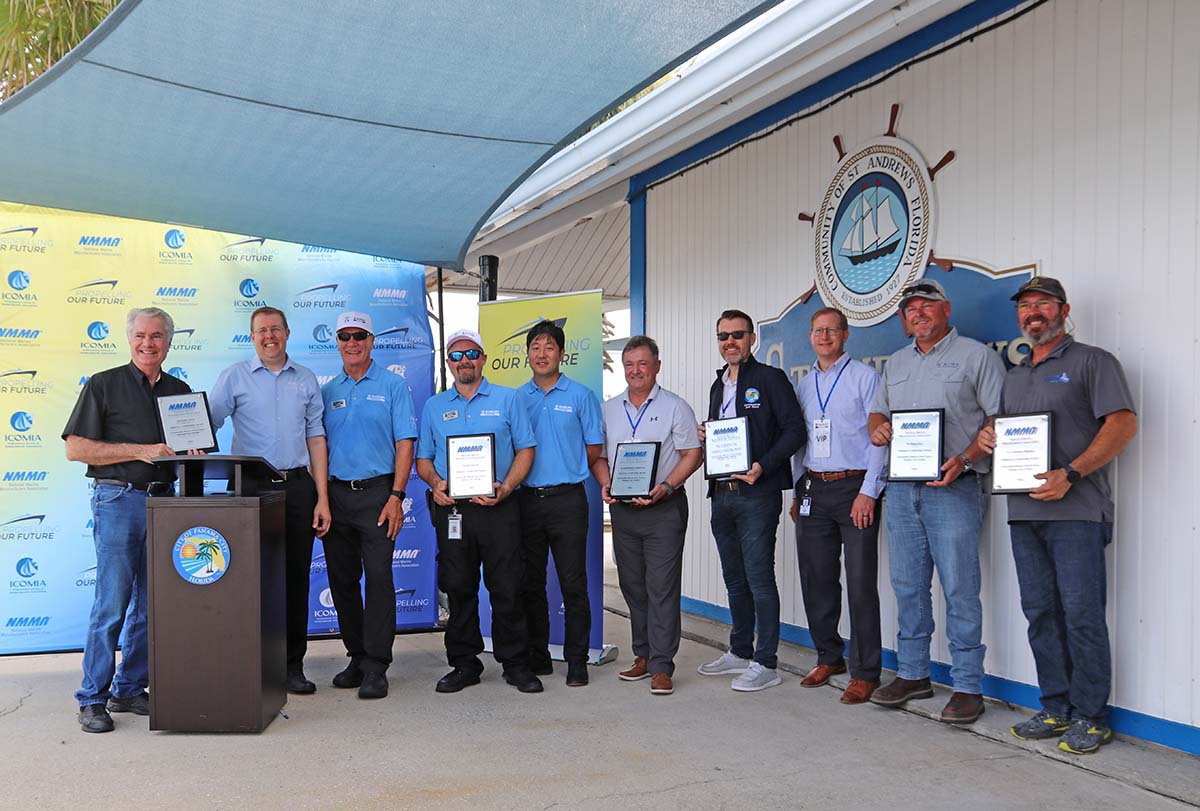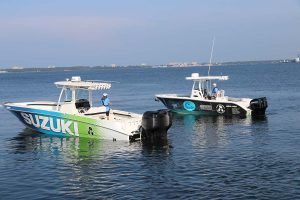
Industry Uses Kick Off Event to Build Wave of Interest for Sustainable Marine Fuels
Published on August 21, 2024On July 2, 2024, just in time for the Independence Day boating weekend, a small tanker truck full of Purfuels sustainable marine fuel offloaded into the storage tanks of St. Andrews Marina in Panama City, Florida, and a newly branded waterside fuel pump was opened for business. It marked the first time sustainable marine fuel was available for sale outside of Texas.
It was an event worthy of hoopla, which included speeches by Jeff Wasil of the National Marine Manufacturer’s Association (NMMA) and recognition for stakeholders including sustainable fuel manufacturer Hyperfuels, local fuel distributor SC Rowe, Suzuki Marine USA (whose Panama City-based U.S. Technical Center, regional clout and hard work helped pull this off), and Brian Hamilton, general manager of municipally owned St. Andrews Marina and Downtown Panama City Marina. The unveiling was attended by dozens of people, including city managers, councilmen and commissioners, a U.S. congressman, a state senator and a few local television news crews.
This level of local attention shows what a significant accomplishment getting the fuel there was. If the NMMA and other industry stakeholders can work their will, however, this will someday become a routine occurrence across Florida, the Northeastern states and other regions with high levels of boating activity.
Why This Matters
Although recreational boating is responsible for only 0.1% of annual global carbon emissions, the boating industry, led by NMMA, is dedicated to further reducing the environmental impact of this popular outdoor activity. There is no one-size-fits-all solution to achieve this, given the wide range of powerboats and how they are used. Electric propulsion will play a role. Hydrogen and other future fuels will play a role. Things that haven’t even been thought of yet will play a role. However, with 12 million recreational boats on the water in the United States (each with a life expectancy of up to 50 years), new sustainable marine fuels have the potential to make a huge impact by reducing boating propulsion emissions by as much as 90%. More importantly, they can do this while improving engine performance and eliminating ethanol-related fuel system issues.

“These are drop-in fuels that can be used by any gasoline-powered boat without any changes or modifications to the fuel system. This means that marinas and boaters can make an immediate impact on the environment,” Wasil said. “It’s as simple as replacing the ethanol with our oxygenate to make PurFuels ethanol -free premium gasoline,” added Jess Hewitt, president of Hyperfuels.
The Challenges
What’s standing in the way — for now, at least — is the availability of these fuels at local marinas. This is a formidable obstacle, and something the industry has been working on for some time. The NMMA worked with the EPA to pass the federal Fuels Streamlining Rule in 2020, making it somewhat easier to move fuel. Still, there are many obstacles to navigate.
“One of our biggest challenges is that we’re dealing with relatively small quantities in a fuel infrastructure system designed to handle hundreds of millions of gallons,” Wasil said.
To make this Panama City launch happen, Hyperfuels had to lease a railcar to bring 28,000 gallons of Ideal EMP (the sustainable blendstock) to a local transloading yard, where it could be splash blended with zero-ethanol gasoline from a local terminal and trucked by fuel distributor SC Rowe to the marina. A load also went to Suzuki Marine’s U.S. Technical Center in Panama City, where it is the sole fuel used in its fleet of test boats.
It took many people and a lot of work to make this happen — but hopefully it will be a watershed moment for the industry. “Getting the first shipment in place is the hardest part,” Wasil said. “With one done, now we can begin to build awareness, consumer demand and start to form an infrastructure.”
Marinas Matter Most
A big part of this will require more forward-thinking marinas like St. Andrews in Panama City to get involved and take that initial step toward carrying sustainable fuels. Assuming this is mostly new to them, using available resources to educate themselves about these fuels would be a good first step.
Next, marina operators can contact their local fuel distributor and have them contact Hyperfuels. Hyperfuels will be able to work with the fuel distributor to sort through all the background logistics, such as state and federal regulations and the tax issues that inevitably crop up when transporting anything across state lines.
Hamilton explained that his two marinas were logical candidates for trying something new. (Downtown Panama City Marina also began selling the fuel two days after the unveiling.) “Both marinas were devastated by Hurricane Michael in 2018, so we were rebuilding from a clean slate. When we were approached by NMMA, Suzuki, SC Rowe and others with the idea of bringing in this new fuel, it was a no brainer,” Hamilton said. In fact, sustainable marine fuel is all that’s sold at either marina.
The fuel does carry a premium price, which depends on many factors. However, that price is offset by its high-performance profile — with no harmful ethanol and 93 octane.
Most fuel customers at St. Andrews are commercial boats and fishing guides, which means they are price sensitive. Hamilton has worked hard to keep pricing competitive with conventional 93 octane fuels available nearby.
“I track fuel sales very closely, and they are right where they should be for a peak summer month,” Hamilton said. “Over the month of July, we sold more than 30,000 gallons of the new Purfuels sustainable marine fuel.” Several other Florida marinas have already reached out to express interest.
The Panama City event laid out a plan that can be adapted for other parts of Florida and other regions of the country. Hyperfuels currently has railcars heading to other areas where premium ethanol-free gasoline is not available, including Dallas, St. Louis, Baltimore, North Haven, Connecticut, and Elizabeth, New Jersey.
“We have a sustainable marine fuels task force that is another avenue for marinas to work through,” Wasil said. “Our task force will help make strategic decisions and prioritize which marinas provide the best options. We’re also looking at ways to combine several marinas in a region that could be served using a common transloading bay.” Achieving this could result in economies of scale to help with pricing and greater efficiency in transport and delivery.
“We are committed to making this happen, for the benefit of our industry, boaters and the environment,” Wasil said. “Getting more marinas involved will be the most important building block in our plan, and it’s a great way for marinas around the country to future-proof their business.”
| Categories | |
| Tags |






